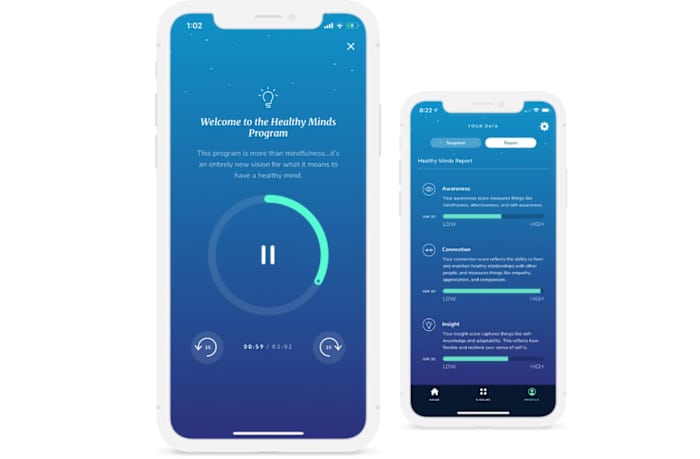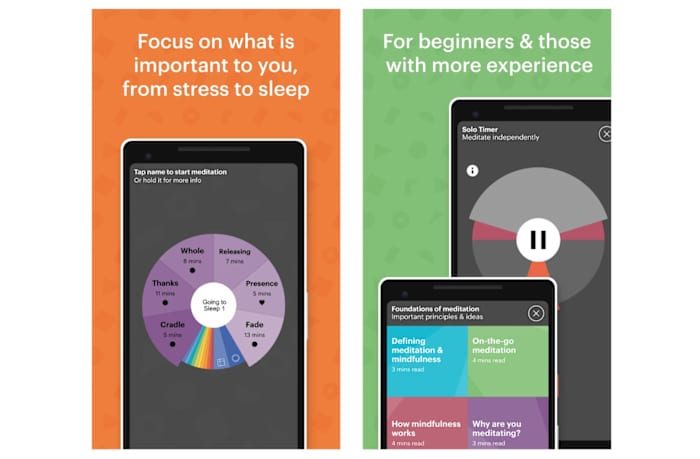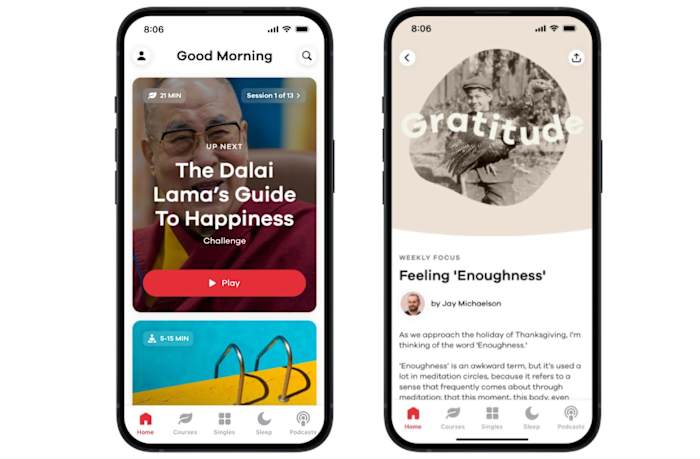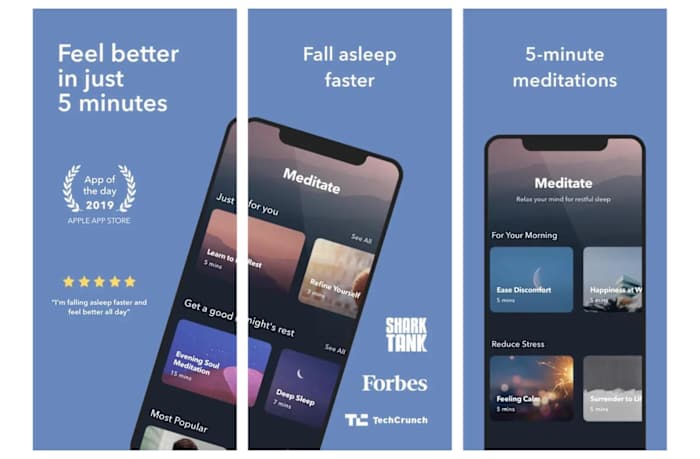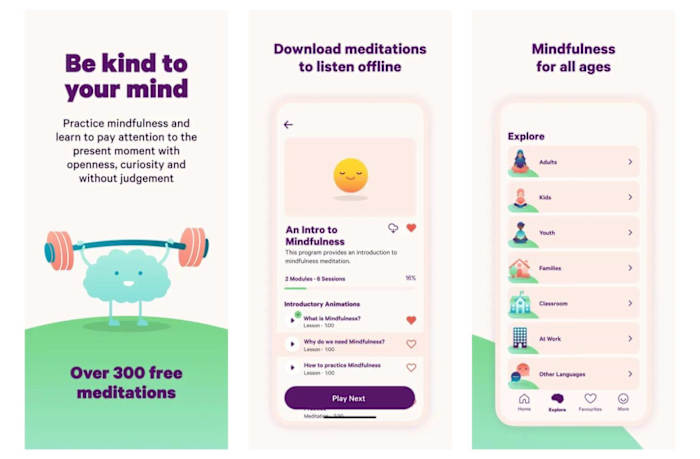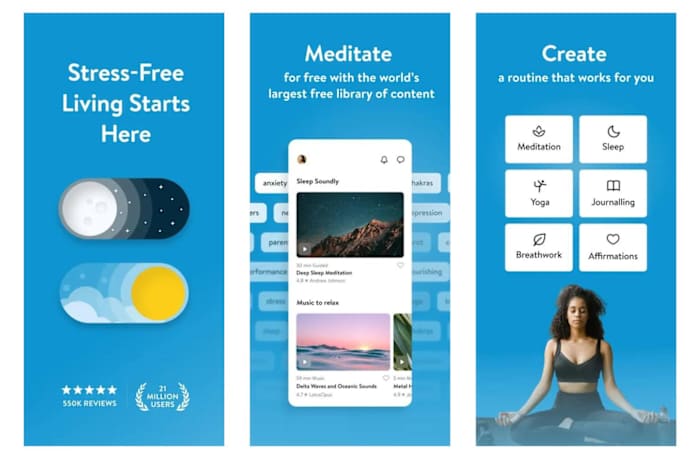The products featured in this article have been independently reviewed. When you buy something through the retail links on this page, we may earn commission at no cost to you, the reader. Sports Illustrated editorial staff are not involved in the creation of this content. Learn more here.
When life gets busy, or downright overwhelming, meditation can be an excellent way to quiet your thoughts and recenter your energy. Meditation is an ancient practice dating back millennia that involves focusing or clearing your mind. The practice has skyrocketed in popularity in recent years, thanks in part to the growth of meditation apps that offer mindfulness and relaxation tools.
These free and paid smartphone apps offer a wide range of programs, including meditation courses, nature sounds, deep breathing exercises and even better sleep podcasts. Whether your goal is to lower your stress levels, sleep more soundly or simply spend a little more time focused on you, a good meditation app can be a great addition to your overall wellness plan.
The best meditation apps in 2024 are user-friendly, have diverse content and fit a variety of lifestyles and wellness goals. With the help of mental health experts, we’ve rounded up the best apps to meditate with and what makes them rank supreme, as well as the benefits of meditation. Whether you’re a beginner or seasoned pro, these apps are worth trying for daily meditation.
This content is meant to be informative, but should not be taken as medical advice. It is not intended for use as diagnosis, prevention or treatment of health problems. Always speak with your doctor before starting any new supplement or exercise regimen.
Our Picks for the Best Meditation Apps in 2024:
- Best Overall Meditation App: Headspace
- Best Free Meditation App: Healthy Minds
- Best Guided Meditation App: Buddhify
- Best Meditation App for Anxiety: Ten Percent Happier
- Best Sleep Meditation App: Calm
- Best Mindfulness Meditation App: Simple Habit
- Best Beginner Meditation App: Smiling Mind
- Best Meditation App For Focus: Insight Timer
Best Overall Meditation App: Headspace
Key features:
- Platforms and ratings: iOS (4.8 stars) and Android (4.4 stars)
- Free trial: 14-day free trial
- Communication options: Buddies feature allows sharing progress with friends
- Features: Guided meditation programs, breathwork, podcasts, exercise tutorials, bedtime stories and more
While there are numerous meditation apps on the market, Headspace is our pick for the best app to mediate with. Headspace is one of the most-downloaded meditation apps available today and has a clean, easy-to-use interface. As our best app to meditate, we love Headspace for its robust content library that includes Sleepcasts (or bedtime stories), breathing exercises for reduced stress and better sleep, inspirational podcasts and, of course, plenty of guided and unguided meditation sessions. Headspace also offers an extensive article library on various wellness topics. Another feature we love about Headspace is that it’s beginner-friendly (while including content for experienced meditators), and even has programs tailored to teaching meditation.
“It offers a structured approach to meditation, particularly through its Headspace Basics program, which is designed for beginners,” explains Florida-based psychotherapist Tesa Saulmon. “This helps individuals establish a strong foundation in their meditation practice.”
Headspace may cost $69.99 for an annual subscription, but the app extends a 14-day free trial to new users.
With a 4.8 out of five-star rating on the Apple Store, Headspace is a fan favorite amongst health apps. Out of nearly one million reviews, many users say Headspace is the “best mindfulness app” and that it’s given them the tools they need to cope with stress or change. While a few users complain that Headspace doesn’t offer any free content, most say the premium subscription is worth it for the excellent mindfulness exercises and variety of meditations.
Pros:
- Content for physical and mental health
- Clean and easy-to-use interface
- Headspace Basics program for beginners
Cons:
- No free version
Best Free Meditation App: Healthy Minds
Key features:
- Platforms and ratings: iOS (4.8 stars) and Android (4.9 stars)
- Free trial: Healthy Minds is free and funded by donors
- Communication options: None
- Features: Active and seated meditation practices, podcast-style lessons and a Healthy Minds report that measures your current level of well-being
Healthy Minds is a basic and no-frills meditation app that’s entirely free thanks to donors. This simple meditation app focuses on four main pillars of wellness: awareness, insight, connection and purpose. Through active and seated meditation practices and podcast-style lessons, Healthy Minds aims to train your mind to be more focused, get curious and stay motivated.
A unique feature that makes Healthy Minds stand out even from higher-end premium apps is its Healthy Minds report, which not only measures your current level of wellbeing, but shows real progress as to how it changes over time as you dive deeper and deeper into its programs. Plus, the lessons are taught by international leading scientists and meditation teachers that help you train your mind with evidence-based strategies and content, supported by decades of research.
On the Google Play store, Healthy Minds has amassed more than 100,000 downloads and a stellar 4.9 out of five-star average. Many users rave about the app’s beginner-friendly content and that lessons are broken down into smaller chunks, making them easier to digest. A few users complain that there’s no offline mode and that the software can get buggy, but it’s a fair tradeoff for no ads and no push to subscribe (high costs keep these users from premium apps).
Pros:
- No push to subscribe
- Five-to-30-minute meditations
- Podcast-style lessons taught by experts
Cons:
- Limited content
Best Guided Meditation App: Buddhify
Key features:
- Platforms and ratings: iOS (4.8 stars) and Android (3.8 stars)
- Free trial: No
- Communication options: Send a meditation to friends or family
- Features: Guided and unguided meditations
Two ways to meditate are through guided sessions (led by an instructor or prompts) or unguided sessions (self-directed at your own pace). For guided meditations that span a variety of topics and needs, look no further than Buddhify, our best meditation app for guided sessions. For a small upfront cost, you’ll have access to Buddhify’s “meditation wheel,” which allows you to choose from meditations that include waking up, going to sleep and dealing with stress.
These guided sessions range from four-to-30 minutes and are taught by hand-picked educators, but if you prefer an unguided practice, Buddhify also offers a meditation timer where you can meditate on your own terms. Those with kids can also get the whole family meditating thanks to Buddhify Kids, a program with sixty meditations designed specifically for young individuals.
Buddhify has an upfront cost of $3.99 on the Google Play app store and $4.99 on the Apple Store. Users love Buddhify for its affordable price point and simplicity, saying that Buddhify has been instrumental in teaching them the art of meditation. Some users note that the meditation voices aren’t engaging, but most say Buddhify’s meditations are calming and offer great insight.
Pros:
- Meditation wheel is customizable
- Includes guided and unguided programs
- Buddhify Kids offers meditation for children
Cons:
- Some users complain of app crashes
Best Meditation App for Anxiety: Ten Percent Happier
Key features:
- Platforms and ratings: iOS (4.8 stars) and Android (4.7 stars)
- Free trial: 30-day free trial
- Communication options: My Circle allows you to complete challenges with friends
- Features: Wellness courses, podcasts, meditations and expert coaching
Studies have long shown that meditation has proven benefits for reducing anxiety. With a simple goal of helping users understand how to lead a happier life, including reducing anxiety, Ten Percent Happier is a robust education platform that offers a variety of wellness courses, podcasts, meditations and expert coaching. Its top-notch programs are taught by the world’s leading meditation teachers, many of whom specialize in mindfulness (or the practice of being aware of one’s surroundings and feelings).
In the course library you’ll find lessons on developing healthy habits, taming anxiety and how to process stress. One of the app’s top podcasts (appropriately dubbed Ten Percent Happier) is taught by inspirational coach and journalist Dan Harris, but there are also shows on parenting, why we have emotions (and what they mean) and real-life transformation stories about the power of meditation. Of course, Ten Percent Happier offers plenty of meditations as well.
While this app is on the more expensive side of $99.99 for an annual subscription, Ten Percent Happier offers a free 30-day trial to determine if it’s right for you. A few users note audio editing issues (i.e. sounds or words cutting out), but the overwhelming majority say Ten Percent Happier has dynamic classes and videos, a diverse mix of teachers and high-quality content.
Pros:
- Includes programs tailored to anxiety
- Courses are broken down into sessions
- Expert-led classes and meditations
Cons:
- Expensive annual cost
Best Sleep Meditation App: Calm
Key features:
- Platforms and ratings: iOS (4.8 stars) and Android (4.5 stars)
- Free trial: Seven-day free trial
- Communication options: Ability to share and use guest passes
- Features: Sleep stories, soundscapes, relaxing music, guided breathing exercises, meditation programs, journals, masterclasses, stretching exercises and podcasts
Calm is often considered the holy grail of meditation apps focused on sleep. Whether you struggle to fall or stay asleep, or you’re simply looking for a new relaxing bedtime routine, Calm is your best bet for soothing bedtime stories and sleep music playlists. In addition, Calm Kids has a library of lullabies and stories for kids as young as three. If sleep aids or sleep-promoting supplements like magnesium aren’t working for you, Calm may be an effective alternative for getting some shut-eye (and you can listen to programs with Bluetooth earbuds if you share a bed with a partner).
Arguably the world’s most popular relaxation app, Calm has more than 130 million downloads and steadily releases new content each week. Regardless of your health goals for using a meditation app, there’s a good chance Calm has something for you. The Calm app is perhaps best-known for its famous Breathe Bubble, which pairs visuals with guided breathing exercises scientifically proven for reducing stress and lowering blood pressure. There’s also an expansive library of relaxing soundscapes and music that can help you wind down at night (or wake up).
Educational psychologist Alex Anderson-Kahl, Ed. S, NCSP, says there’s a reason Calm is so popular.
“Calm has carved a niche for itself with its eclectic mix of guided meditations, sleep narratives and specialized breathing exercises,” he says. “These features cater to a broad spectrum of users, from novices to seasoned meditation practitioners.”
Users agree, noting that Calm’s diverse assortment of wellness tools helps them sleep better. A few even note that it has helped them manage insomnia, a common sleep disorder. While some users complain about the lack of free content (full content access costs $69.99 per year for a premium subscription), many say the price is worth it.
Check out our Calm review for more information on this popular app.
Pros:
- Bedtimes stories for all ages
- Sleep-centered meditation practices
- Breathe Bubble can lower stress at night
Cons:
- Limited content in free version
Best Mindfulness Meditation App: Simple Habit
Key features:
- Platforms and ratings: iOS (4.7 stars) and Android (4.6 stars)
- Free trial: 30-day free trial
- Communication options: None
- Features: Sleep and wellness plans, meditations, progress tracking and coaching content
Simple Habit promises to improve users’ lives with just five minutes of mindfulness and meditation per day. With the goal of developing “simple habits,” the app offers a wide range of meditations and mindfulness content from sleep- and anxiety-focused programs, to patient parenting and even finding relief from illness or health conditions. Through Simple Habit, users can build a meditation habit, improve focus and develop increased self-awareness.
In case you need a little extra motivation, Simple Habit can nudge you with timed reminders to complete a mindfulness practice each day. For even further motivation, you can also track your progress with streak tracking, or listen to coaching content led by mindfulness experts and motivational talks. All in all, you can expect to walk away from your Simple Habit app use with a positive mindset and a deeper appreciation for stillness and taking a moment to unwind.
Simple Habit may be costly at $89.99 per year, but new users get a free one-month trial to test the waters. Still, even though a high price point is a complaint amongst users, most say the app provides a truly relaxing experience, with one user even likening it to a “calm, warm hug.”
Pros:
- Streak and progress tracking
- Mindfulness programs tackle all topics
- Can set reminders to meditate
Cons:
- High price point
Best Beginner Meditation App: Smiling Mind
Key features:
- Platforms and ratings: iOS (4.7 stars) and Android (4.8 stars)
- Free trial: App is free
- Communication options: None
- Features: Mindfulness courses, sleep programs and well-being check-in
Meditation apps can get pricey, but Smiling Mind delivers an excellent meditation experience that’s both free and beginner-friendly. Focused almost exclusively on mindfulness (and how it can benefit sleep, anxiety and overall wellness), Smiling Mind is a simple platform that introduces users who are new to meditation to exactly what the practice is, and how it can be beneficial.
Through meditation 101-style programs, you’ll learn the foundations of mindfulness, practice mindfulness exercises and learn how mindfulness can relate to everything from work to eating. Simple Minds also offers a well-being check-in where you can track your daily mood. Plus, the app is family-friendly and includes content for both adults and children, making it usable for all.
Overall, Smiling Mind has overwhelmingly positive reviews where many customers note that the app has truly improved their mental health and increased their gratitude. A few wish there were more visual lessons, as programs are largely auditory. However, most say Simple Minds is relatively easy to use and is an excellent alternative to paid meditation apps or premium subscriptions.
Pros:
- Content for adults and kids
- Beginner-friendly programs
- Primarily focused on mindfulness
Cons:
- Few visual exercises (mostly auditory)
Best Meditation App For Focus: Insight Timer
Key features:
- Platforms and ratings: iOS (4.9 stars) and Android (4.8 stars)
- Free trial: App is free
- Communication options: Ability to add friends and join a community hub
- Features: Guided and unguided meditation programs, ambient music, bedtime stories, breathwork, yoga, journaling, mood check-ins and mantras
Whether you want to improve your focus at work or in your personal life, having a good meditation app on hand can be a great way to practice your focus skills and calm your mind. Since one of the primary goals of meditation is reeling in your thoughts, an app like Insight Timer—which has a free version—can help you learn how to do just that.
Billing itself as “five wellbeing apps in one,” Insight Timer includes a wide range of programs that focus on meditation, sleep, breathwork, yoga and contemplation, or journaling and jotting down your mood. A variety of guided breathing exercises can help you refocus your mind, while curated relaxing playlists can be played in the background while working or doing a project.
With a 4.9-star average rating amongst iPhone users, Insight Timer is a big hit for its easy breathwork and mindfulness exercises, relaxing music options and content for all ages (parents especially love the bedtime stories for kids). While some say the design is a little cluttered, most users agree that the free version of Insight Timer easily compares to premium programs; that being said, Insight Timer has a premium plan with more content that costs $59.99 annually.
Pros:
- Includes more than 120,000 meditations
- Attend live yoga classes via the app
- Ability to join wellness workshops
Cons:
- Meditation library can be overwhelming
What Is Meditation?
Meditation is an ancient practice dating back thousands of years that involves focusing or clearing your mind. It includes a combination of mental and physical techniques that are designed to reduce stress, improve focus and enhance overall mental clarity. Before the rise of meditation apps for smartphones, meditation was often done on one’s own or via a meditation studio. Now, meditation apps make meditation more accessible—and much easier to learn.
Health Benefits of Meditation
People practice meditation for a variety of reasons, some of which are as common as reducing stress, while others turn to meditation to quit tobacco use. Whatever your reason for meditating might be, one thing is for certain: meditation has a vast range of scientifically-proven benefits. Studies show that meditation can decrease negative mood and enhance attention, alleviate symptoms of depression, anxiety and pain, boost creativity and even prevent age-related brain degeneration, or progressive neurological diseases like Alzheimer’s disease and dementia.
While meditation won’t replace in-person or online therapy if you’ve been diagnosed with a mental health condition, it can be a great adjunct to a mental health care plan or wellness regimen.
“Meditation can be beneficial for almost everyone, as it’s a great way to reduce stress and improve overall wellbeing,” explains psychotherapist Gary Tucker, chief clinical officer at D’Amore Mental Health. “It can also help individuals gain insight into their thoughts, feelings and behaviors.”
Still, if you’re unsure whether meditation is right for you, Tucker recommends checking with a healthcare provider to discuss the pros and cons of downloading an app.
Types of Meditation
There’s no one-size-fits-all approach for meditation, and while it may come as a surprise, there’s actually no one correct way to meditate as well. Meditation comes in many different forms and is rooted in several different cultures, all of which have unique techniques and practices. Here are the different types of meditation that you may encounter on your smartphone apps.
Mindfulness meditation
Mindfulness meditation is a form of practice that involves remaining aware of your feelings and surroundings, rather than letting your mind wander. Many people choose to do mindfulness meditation seated with their eyes closed, relaxing and bringing their attention to their breath or feelings.
“Mindfulness meditation focuses on the present moment and is designed to help individuals become more aware of their thoughts, feelings and body,” Tucker says.
This can be helpful for understanding sources of stress, and more importantly, learning to let them go.
Guided meditation
Guided meditation is another popular practice that involves imagery, an instructor or recordings that provide instructions on how to meditate. This type of meditation, Tucker explains, is often used to enhance focus or bring awareness to a certain sensation or feeling. Guided meditation can be helpful for those who are new to meditation, or have a tough time focusing on their own.
Walking meditation
Walking meditation, or meditation with movement, is a practice where people focus on their breathing while walking or doing other active activities. Others choose to focus on their surroundings and observe what’s around them. Studies show that even 10 minutes of brisk walking meditation is enough to improve mood state, while other research has found that walking meditation (which is rooted in Buddhist principles) can effectively reduce depression.
Progressive muscle relaxation meditation
Progressive muscle relaxation meditation involves gently tensing and releasing one muscle group at a time, while keeping your focus trained on that muscle group and the feelings it invokes. Many people turn to progressive muscle relaxation meditation for sleep, since this practice can help control anxiety response, relieve stress and relax you for better sleep.
Reflection meditation
Reflection meditation, or reflective meditation, is a process of self-reflection where an individual chooses a question, situation or topic to reflect upon. This can allow people to get a clear and unbiased view of their feelings and emotions, which can be helpful for understanding sources of stress or anxiety.
Sound meditation
Sound meditation, or sound baths, use music and sound to help clear the mind and encourage people to enter deep meditation. Studies show that this ancient practice can significantly reduce tension, anger, fatigue and symptoms of depression. Young adult therapist Mollie Spiesman, LCSW, says sound meditation can also “anchor attention and promote relaxation.”
Focused attention meditation
Focused attention meditation, or more simply focused meditation, is a practice where individuals focus intently on an object, smell or sound in front of them. This practice involves letting feelings freely enter and pass through the mind before returning one’s focus back to the object at hand. Not only can focused attention meditation improve focus itself, research shows it can actually strengthen the brain.
Transcendental meditation
Transcendental meditation is a form of meditation originating in India that involves using mantras, or phrases or words, that people focus on and repeat in their minds. Not only can repeating a mantra help you focus, studies show that practicing mantras can reduce stress.
How to Choose the Best Meditation Apps for You
While most meditation apps operate around the same principle of helping users relax and improve their overall wellbeing, each app on our best meditation apps list is different in its own unique way. Some apps have a greater focus on sleep, while others are designed for stress relief. Consider these factors when determining which meditation app is right for your needs.
Health goals
You may have one or several reasons for using a meditation app. Perhaps you’re struggling to fall asleep, or you want to boost your focus at work. Whatever your health goals might be, it’s important to find a meditation app with tools and programs that can help you achieve your goal(s). If sleep is your primary focus, you may want to lean towards an app like Calm, which has an extensive library of bedtime stories and sleep-centered meditation. Or, if you’re looking to reduce anxiety, an app like Ten Percent Happier may be one of the better options for you.
Skill level
People using meditation apps have every range of skill levels. Some are beginners and have never encountered meditation before, while others are seasoned practitioners who have used meditation for many years. While no app on our list is specifically designed for mediation experts, some, like Smiling Mind, are more beginner-friendly than others. Be sure to consider your skill level when seeking out a meditation app, especially if you’re new to the practice.
Content
Meditation apps can have a wide range of content. Some are specifically focused on meditation themselves, while others include breathwork, journaling and bedtime stories. Some apps are even designed for the entire family and have content specifically created for kids. If you’re looking for an app with a diverse array of content, an app like Calm or Headspace may be best suited for you, while more niche apps like Smiling Mind are primarily focused on meditation.
Communication
If meditating or sharing your progress with friends and family sounds right up your alley, some meditation apps offer communication features where you can add friends or enter friendly competitions. Others are designed specifically for solo use. If communication features will be helpful to your practice—or even help motivate you— you may want to consider apps like Ten Percent Happier that offer features like “My Circle,” where you can complete challenges with friends.
Time commitment
The time commitment you can dedicate to meditating is entirely up to you. If you have a busy schedule or you manage a busy household, squeezing in a lot of time for meditation may not always be possible. If that’s the case, an app like Calm can be helpful, which offers meditations as short as three minutes long. However, if you’re able to devote longer periods to your practice, an app like Simple Habit allows you to get involved in more robust meditation or education programs.
Cost
Cost will undoubtedly be a deciding factor in most decisions when it comes to choosing a meditation app. Some meditation apps are entirely free, while others are subscription-only and can range in cost from just under $5 to as much as around $100. It’s no secret that the pricier apps with subscription options tend to have more content, but that doesn’t mean that free or low-cost meditation apps won’t provide the content you need to make positive changes in your life. When choosing an app, be sure to consider your budget, needs and any recurring fees.
Plus, if you’re just not sure if a paid app is right for you, the majority of premium apps offer free trials that range from seven to 30 days, allowing you to test the waters and try out their features before making a decision.
Our Methodology: How We Chose the Best Meditation Apps
There are a number of factors we considered when choosing the best meditation apps. Quality of content, variety of programs, cost, subscription options, progress tracking and overall design and interface were essential in our decisions. We also looked at brand reputation, customer reviews and overall ratings on the Apple and Google Play stores. Plus, we considered the feedback from our mental health experts about which apps ranked supreme and why.
Calm vs. Headspace
Calm and Headspace are two of the most popular meditation apps on the market. They have many of the same features—both cost $69.99 for an annual subscription, and are designed around the same principles of meditation, sleep, focus and movement. Those who are new to meditation may find Headspace more beginner-friendly, however some users agree that Calm has more structured meditation programs over its competitor. Still, Headspace has a much cleaner design and tends to be more user-friendly. If you’re a beginner meditator, you may want to try Headspace first, but those who are looking for more structure may benefit from Calm.
Meditation App FAQs
Here’s everything else you should know about meditation apps.
How often should you meditate?
While there’s no general consensus on how often you should meditate, research shows that as little as 13 minutes of meditation per day over the course of eight weeks is enough to decrease negative mood, lower anxiety and increase attention. Still, whether you meditate daily or once or twice a week, it’s important to find a cadence that works well for you and fits into your schedule.
What is the best time to meditate?
There’s no right or wrong time to meditate, but many people enjoy meditating in the morning when their mind is most quiet, and because it adds a positive start to the day. However, meditating at night is another great option, especially if you want to quiet your mind before bed.
Are meditation apps safe?
Meditation apps are generally considered safe, but it’s important not to use apps in place of medical advice or treatment if you’ve been diagnosed with a mental health condition. If you’re unsure if meditation apps are right for you, it’s always a good idea to check with a healthcare provider.
Does guided meditation work for everyone?
Meditation offers a host of proven benefits, but that doesn’t mean it’s right for everyone. Some people report unwanted side effects from meditation, such as increased anxiety or depression, greater self-criticism and a need for continuous meditation. If meditation is making you feel worse, it’s smart to stop the practice and/or talk to a healthcare provider about your concerns.
What is the difference between meditation and mindfulness?
Meditation and mindfulness are both relaxation strategies that differ in their approach. Meditation is a practice that quiets thoughts to calm and relax the mind, while mindfulness is a practice of being aware of one’s self, surroundings and physical and emotional sensations.
Final Thoughts
Whether your goal is to improve focus, sleep better or lower anxiety, a meditation app can be a great addition to your wellness regimen. The best meditation apps use science-proven methods (and offer programs taught by meditation experts) that are designed to help users calm their minds and focus their thoughts. If you’re considering downloading or subscribing to a meditation app, be sure to check our list for our best meditation apps of 2024 and how each one works.
Prices are accurate and items in stock as of publish time.


